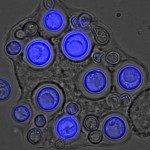Link to Pubmed [PMID] – 24740084
J. Clin. Microbiol. 2014 Jul;52(7):2328-33
This study was undertaken to examine the performance of the Fungitell β-glucan (BG) assay, to compare it with that of the galactomannan (GM) test for the diagnosis of invasive aspergillosis (IA) in patients with hematological malignancies, and to examine the rates of false-positive BG and GM test results due to β-lactam antibiotics among sera of patients with Gram-positive or Gram-negative bacteremia and selected sera with false-positive results from the GM test. Serum samples from 105 patients with proven (n = 14) or probable (n = 91) IA, 97 hematology patients at risk for invasive fungal infections, 50 healthy blood donors, and 60 patients with bacteremia were used to study the sensitivities and specificities of the assays. The GM test was more specific than the BG assay (97% versus 82%, respectively; P = 0.0001) and the BG assay was more sensitive than the GM test (81% versus 49%, respectively; P < 0.0001) for IA diagnosis. The study of 49 separate batches of β-lactam antibiotics showed high and very similar rates of false-positive results for the GM and BG assays (29 and 33%, respectively; P = 0.82) but with an almost complete lack of concordance between the 2 assays. For patients with bacteremia, the rate of false-positive results was much higher with the BG test than with the GM test (37% versus 2%, respectively; P < 0.0001), with no significant difference between Gram-positive and Gram-negative bacteremia. In conclusion, the BG test may be useful for the diagnosis of IA because of its high sensitivity in comparison with the GM test, but the overall benefit of this assay remains limited because of its inadequate specificity and its cost.

